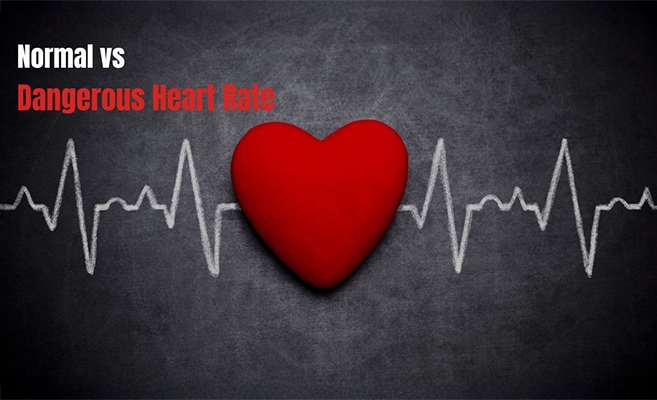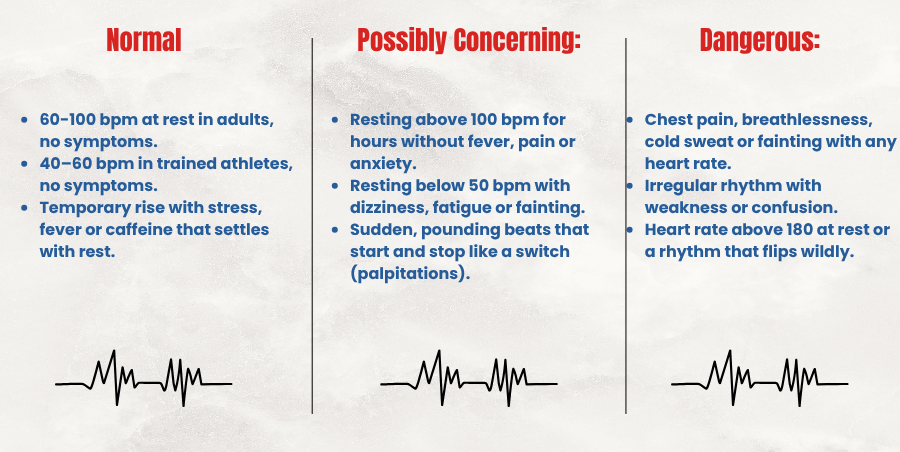Normal Heart Rate vs. Dangerous Heart Rate: Key Differences Explained

A healthy heart rate usually falls between 60 and 100 beats per minute. But when the number is too high, drops too low or the rhythm becomes irregular, it may be a sign of trouble that needs immediate attention.
Your heart talks in numbers. Each beat carries a message about your stress, sleep, fitness and overall health. In this guide, our cardiology experts at PSRI Hospital, Delhi explain the key differences between a normal heart rate vs dangerous heart rate. You will learn the exact heart rate ranges, how to check your pulse rate correctly, the warning signs you should never ignore, how to measure correctly and when to seek urgent help.
Let’s break down what counts as normal, what is a red flag and how to act with confidence if your pulse feels “off.”
Normal vs. Dangerous Heart Rate: Everything You Need to Know
Understanding the difference between a normal heart rate and a dangerous heart rate can guide you on when it is safe to wait and when to consult with a doctor immediately.
What is a Normal Heart Rate?
Your heart rate changes with age, fitness, medicines, stress, temperature and illness.
- For most adults, a normal heart rate is 60-100 beats per minute (bpm).
- Children have higher ranges which you can check using a heart rate chart by age.
- Athletes may have a lower resting heart rate, often 40-60 bpm, without problems.
During activity:
- The pulse rises into target heart rate zones and may reach the maximum heart rate.
- After exercise, a healthy recovery heart rate should come back to baseline within minutes.
Thumb Rule: If your heart rate remains very high long after you stop or you feel faint, slow down and hydrate. If symptoms persist, get in touch with the experts immediately.
What is a Dangerous Heart Rate?
A rate becomes risky when it is too high, too low or irregular. Let’s check what can be dangerous and requires an appointment immediately with a heart specialist near me.
- Over 100 bpm sustained.
- Low with symptoms: Below 60 bpm along with weakness, dizziness or fainting.
- Very low (<35–40 bpm): Needs urgent review.
- Sometimes the issue is not the number but the rhythm. A cardiac arrhythmia or irregular heartbeat can be unsafe even when the pulse seems normal.
Remember: “normal” includes your personal baseline. If your usual is 62 and it becomes 88 for days without a clear reason, note it.
Why Can Heart Rate Turn Abnormal?
Understanding the common causes helps you know when it’s normal and when it needs medical attention.
- Dehydration or fever
- Stress, panic or poor sleep
- Thyroid problems
- Anaemia
- Electrolyte imbalance (low potassium, magnesium or sodium)
- Infections or lung issues
- Heart rhythm problems (e.g., atrial fibrillation, SVT)
- Medicines or stimulants (decongestants, energy drinks)
- Alcohol or recreational drugs

If your number stays off for days, look beyond the pulse. Book a visit with a heart doctor near me and share your details with them.
Symptoms That Signal a Dangerous Heart Rate
Let’s check the symptoms that reveal if your heart rate is safe or dangerous:
- Chest pressure or pain
- Shortness of breath at rest
- Dizziness, near-faint or fainting
- Blue lips or fingertips
- Swelling of feet with fatigue
- Sudden drop in exercise tolerance
We advise you not to wait if these warning signs appear. Our NABH-accredited Cardiac Sciences Department and 24×7 Emergency Unit are prepared to give you immediate and expert care at PSRI Hospital.
How We Evaluate an Abnormal Heart Rate at PSRI Hospital
At PSRI, known as the best hospital in Delhi, our cardiology team follows a clear, step-by-step plan. You will know what we are checking and why.
1) Triage, history and vitals
- When it started. How often it happens.
- Triggers: exertion, stress, caffeine, alcohol, fever, dehydration, sleep loss.
- Current medicines and doses.
- Blood pressure, temperature, oxygen level and pulse.
2) ECG (electrocardiogram)
- A quick test that shows your heart’s rhythm and conduction.
- Helps detect fast, slow or irregular beats the moment you arrive.
3) Targeted blood tests
- Thyroid profile, haemoglobin (CBC) and electrolytes.
- Cardiac markers when symptoms suggest heart strain.
- Tests are run on-site for faster decisions.
4) Holter or patch monitor
- Worn for 24-72 hours (or longer) to record rhythm through the day and night.
- Captures events that a clinic ECG can miss.
5) Echocardiogram (heart ultrasound)
- Reviews pumping strength, valves and heart structure.
- Checks for causes that can drive fast, slow or irregular rates.
6) Exercise stress testing (if appropriate)
- Look at how your heart responds to exertion when symptoms occur on activity.
- Done with cardiologist supervision and safety protocols.
7) Advanced rhythm assessment (when needed)
- Electrophysiology (EP) study by our EP team for complex or recurrent arrhythmias.
- Guides treatment such as catheter ablation, pacemaker or ICD where indicated.
8) Personalised plan and safety net
- We explain results in plain language and agree on next steps.
- Triggers to avoid, medicine review and follow-up schedule.
- Same-campus escalation if required: OPD → ER → ICU → Cath-lab.
What to bring: a list of your medicines, past reports and any smartwatch or oximeter readings. Simple notes on when episodes happen (time, activity, symptoms) help us reach the right answer faster.
Simple daily habits for a steadier heart rate
- Walk 30 minutes everyday.
- Eat balanced meals with less salt and fewer ultra-processed foods.
- Drink water throughout the day and limit alcohol.
- Manage stress with breathing, brief mindfulness or stretching.
- Take medicines exactly as prescribed. Never stop heart pills suddenly.
Book an Appointment at PSRI Hospital for a Heart Check-Up
At PSRI Hospital, Delhi, we provide advanced and reliable heart care under one roof:
- 200+ bed NABH-accredited super-speciality hospital.
- 500+ heart surgeries every year by experienced specialists.
- 60+ ICU beds dedicated to cardiac, neuro and transplant care.
- 24×7 Emergency & cath-lab support for rapid intervention.
- Cutting-edge technology: ECG, Echo, Holter, EP mapping and advanced cath-lab systems.
- Led by renowned cardiologists with decades of expertise.
If your pulse is too fast, too slow or irregular especially with chest pain, breathlessness or fainting, don’t delay.
- Call +91 84 84 84 84 17 to book your heart check-up
- Visit psrihospital.com to schedule online
FAQ’s
Q1. What is a dangerously high heart rate during fever?
Ans. A resting heart rate above 120 bpm with fever and symptoms like chest pain or dizziness is dangerous and needs urgent review.
Q2. Can dehydration cause a dangerous heart rate?
Ans. Yes, dehydration can trigger a fast pulse. If it stays high after rehydration or causes weakness or fainting, seek medical help.
Q3. Does anxiety increase heart rate permanently?
Ans. No, anxiety causes temporary spikes. If your heart rate stays high at rest or feels irregular, it may indicate another problem.
Q4. Is a low heart rate while sleeping normal?
Ans. Yes, during deep sleep the pulse may drop below 60. If it goes below 40 with symptoms, it needs evaluation.
Q5. When should I worry about palpitations at night?
Ans. If palpitations at night come with breathlessness, chest pain or dizziness, they may signal a dangerous arrhythmia and require urgent care.

 Book An Appointment
Book An Appointment Virtual Consultation
Virtual Consultation





